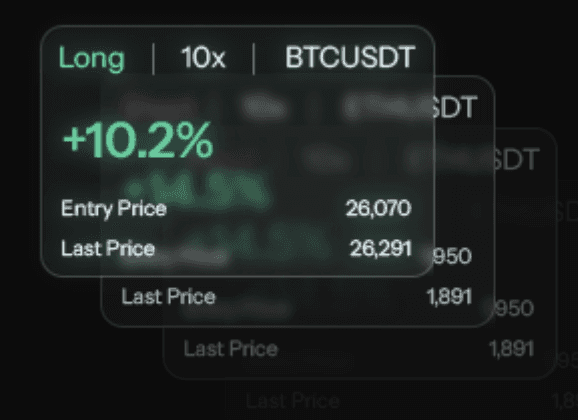Understanding ETFs, Spot Trading, and the Potential Impact of a Bitcoin ETF by BlackRock
Jun 25, 2023
Cryptocurrencies have gained immense popularity over the years, and investors are constantly seeking new avenues to gain exposure to this digital asset class. One such avenue is through Exchange-Traded Funds (ETFs). In this post, we will delve into the concept of ETFs, explore the differences between spot and futures trading, and discuss the potential effects of a major asset management company like BlackRock launching a Bitcoin ETF.
What is an ETF?
An Exchange-Traded Fund (ETF) is an investment vehicle that combines the features of a mutual fund and a stock. It offers investors exposure to a diversified portfolio of assets, which can range from stocks, bonds, commodities, or even cryptocurrencies like Bitcoin. ETFs are listed and traded on stock exchanges, allowing investors to buy and sell shares throughout the trading day at market prices.
Spot Trading vs. Futures Trading:
Spot trading involves the immediate purchase or sale of an asset, such as cryptocurrencies, at the current market price, also known as the spot price. It involves the direct ownership and transfer of the underlying asset, making it the most straightforward form of trading. Investors who engage in spot trading typically take ownership of the asset and store it in digital wallets.
On the other hand, futures trading involves buying or selling contracts that obligate traders to transact the asset at a predetermined price and date in the future. These contracts are standardized and traded on regulated exchanges. Futures trading allows investors to speculate on the future price movement of the asset without owning it physically. It can involve leverage and requires a margin account.
The Potential Impact of a Bitcoin ETF by BlackRock:
BlackRock is a prominent asset management company that commands significant influence in the financial industry. If BlackRock were to launch a Bitcoin ETF, it would have several potential effects on the cryptocurrency market.
1. Increased Accessibility: A Bitcoin ETF by BlackRock would make it easier for traditional investors, including non-accredited individuals, to gain exposure to Bitcoin without the complexities of purchasing and storing the cryptocurrency themselves. This increased accessibility could attract a larger pool of investors since you could add Bitcoin to your IRA, pension fund and more, potentially driving up demand and liquidity for Bitcoin.
2. Market Validation: The entry of a major player like BlackRock into the Bitcoin ETF space would likely be perceived as a validation of Bitcoin as a legitimate asset class. It could lead to increased confidence among institutional and retail investors, attracting more capital into the cryptocurrency market.
3. Price Volatility and Liquidity: The launch of a Bitcoin ETF could impact the price volatility and liquidity of the cryptocurrency. The increased trading activity associated with the ETF could introduce additional liquidity to the market, potentially reducing price volatility. However, it's worth noting that the impact on volatility would depend on various factors, including market sentiment and overall demand.
4. Regulatory Attention: The launch of a Bitcoin ETF by a large asset management company may draw increased regulatory attention. Regulators might scrutinize the product to ensure compliance with existing securities regulations, potentially leading to additional oversight and guidelines for the broader cryptocurrency market.
5. Price Increase: BlackRock currently has ~$10 trillion, assuming BlackRock want to invest a mere 0.5% that is $50B invested into bitcoin from them alone. The following is an incorrect calculation since this is not how market cap is calculated, however, the last time Bitcoin’s market cap was at $650B (+$50B form current market cap) it was priced at $34k, so just imagine what new heights Bitcoin price could reach if BlackRock succeeds.
Conclusion:
ETFs offer investors an accessible and regulated means to gain exposure to various asset classes, including cryptocurrencies. While there are currently no ETFs representing spot cryptocurrencies available to non-accredited investors, futures-based ETFs exist but may carry higher expense ratios. The introduction of a Bitcoin ETF by a major asset management company like BlackRock could have a significant impact on the cryptocurrency market, including increased accessibility, market validation, potential changes in price volatility and liquidity, and heightened regulatory attention. As the cryptocurrency landscape continues to evolve, it's important for investors to stay informed and consider the potential implications of new investment products.
Disclaimer: This post is for informational purposes only and should not be considered financial advice. It is essential to conduct thorough research and consult with professionals before making any investment decisions.

Understanding ETFs, Spot Trading, and the Potential Impact of a Bitcoin ETF by BlackRock
Jun 25, 2023
Cryptocurrencies have gained immense popularity over the years, and investors are constantly seeking new avenues to gain exposure to this digital asset class. One such avenue is through Exchange-Traded Funds (ETFs). In this post, we will delve into the concept of ETFs, explore the differences between spot and futures trading, and discuss the potential effects of a major asset management company like BlackRock launching a Bitcoin ETF.
What is an ETF?
An Exchange-Traded Fund (ETF) is an investment vehicle that combines the features of a mutual fund and a stock. It offers investors exposure to a diversified portfolio of assets, which can range from stocks, bonds, commodities, or even cryptocurrencies like Bitcoin. ETFs are listed and traded on stock exchanges, allowing investors to buy and sell shares throughout the trading day at market prices.
Spot Trading vs. Futures Trading:
Spot trading involves the immediate purchase or sale of an asset, such as cryptocurrencies, at the current market price, also known as the spot price. It involves the direct ownership and transfer of the underlying asset, making it the most straightforward form of trading. Investors who engage in spot trading typically take ownership of the asset and store it in digital wallets.
On the other hand, futures trading involves buying or selling contracts that obligate traders to transact the asset at a predetermined price and date in the future. These contracts are standardized and traded on regulated exchanges. Futures trading allows investors to speculate on the future price movement of the asset without owning it physically. It can involve leverage and requires a margin account.
The Potential Impact of a Bitcoin ETF by BlackRock:
BlackRock is a prominent asset management company that commands significant influence in the financial industry. If BlackRock were to launch a Bitcoin ETF, it would have several potential effects on the cryptocurrency market.
1. Increased Accessibility: A Bitcoin ETF by BlackRock would make it easier for traditional investors, including non-accredited individuals, to gain exposure to Bitcoin without the complexities of purchasing and storing the cryptocurrency themselves. This increased accessibility could attract a larger pool of investors since you could add Bitcoin to your IRA, pension fund and more, potentially driving up demand and liquidity for Bitcoin.
2. Market Validation: The entry of a major player like BlackRock into the Bitcoin ETF space would likely be perceived as a validation of Bitcoin as a legitimate asset class. It could lead to increased confidence among institutional and retail investors, attracting more capital into the cryptocurrency market.
3. Price Volatility and Liquidity: The launch of a Bitcoin ETF could impact the price volatility and liquidity of the cryptocurrency. The increased trading activity associated with the ETF could introduce additional liquidity to the market, potentially reducing price volatility. However, it's worth noting that the impact on volatility would depend on various factors, including market sentiment and overall demand.
4. Regulatory Attention: The launch of a Bitcoin ETF by a large asset management company may draw increased regulatory attention. Regulators might scrutinize the product to ensure compliance with existing securities regulations, potentially leading to additional oversight and guidelines for the broader cryptocurrency market.
5. Price Increase: BlackRock currently has ~$10 trillion, assuming BlackRock want to invest a mere 0.5% that is $50B invested into bitcoin from them alone. The following is an incorrect calculation since this is not how market cap is calculated, however, the last time Bitcoin’s market cap was at $650B (+$50B form current market cap) it was priced at $34k, so just imagine what new heights Bitcoin price could reach if BlackRock succeeds.
Conclusion:
ETFs offer investors an accessible and regulated means to gain exposure to various asset classes, including cryptocurrencies. While there are currently no ETFs representing spot cryptocurrencies available to non-accredited investors, futures-based ETFs exist but may carry higher expense ratios. The introduction of a Bitcoin ETF by a major asset management company like BlackRock could have a significant impact on the cryptocurrency market, including increased accessibility, market validation, potential changes in price volatility and liquidity, and heightened regulatory attention. As the cryptocurrency landscape continues to evolve, it's important for investors to stay informed and consider the potential implications of new investment products.
Disclaimer: This post is for informational purposes only and should not be considered financial advice. It is essential to conduct thorough research and consult with professionals before making any investment decisions.

Understanding ETFs, Spot Trading, and the Potential Impact of a Bitcoin ETF by BlackRock
Jun 25, 2023
Cryptocurrencies have gained immense popularity over the years, and investors are constantly seeking new avenues to gain exposure to this digital asset class. One such avenue is through Exchange-Traded Funds (ETFs). In this post, we will delve into the concept of ETFs, explore the differences between spot and futures trading, and discuss the potential effects of a major asset management company like BlackRock launching a Bitcoin ETF.
What is an ETF?
An Exchange-Traded Fund (ETF) is an investment vehicle that combines the features of a mutual fund and a stock. It offers investors exposure to a diversified portfolio of assets, which can range from stocks, bonds, commodities, or even cryptocurrencies like Bitcoin. ETFs are listed and traded on stock exchanges, allowing investors to buy and sell shares throughout the trading day at market prices.
Spot Trading vs. Futures Trading:
Spot trading involves the immediate purchase or sale of an asset, such as cryptocurrencies, at the current market price, also known as the spot price. It involves the direct ownership and transfer of the underlying asset, making it the most straightforward form of trading. Investors who engage in spot trading typically take ownership of the asset and store it in digital wallets.
On the other hand, futures trading involves buying or selling contracts that obligate traders to transact the asset at a predetermined price and date in the future. These contracts are standardized and traded on regulated exchanges. Futures trading allows investors to speculate on the future price movement of the asset without owning it physically. It can involve leverage and requires a margin account.
The Potential Impact of a Bitcoin ETF by BlackRock:
BlackRock is a prominent asset management company that commands significant influence in the financial industry. If BlackRock were to launch a Bitcoin ETF, it would have several potential effects on the cryptocurrency market.
1. Increased Accessibility: A Bitcoin ETF by BlackRock would make it easier for traditional investors, including non-accredited individuals, to gain exposure to Bitcoin without the complexities of purchasing and storing the cryptocurrency themselves. This increased accessibility could attract a larger pool of investors since you could add Bitcoin to your IRA, pension fund and more, potentially driving up demand and liquidity for Bitcoin.
2. Market Validation: The entry of a major player like BlackRock into the Bitcoin ETF space would likely be perceived as a validation of Bitcoin as a legitimate asset class. It could lead to increased confidence among institutional and retail investors, attracting more capital into the cryptocurrency market.
3. Price Volatility and Liquidity: The launch of a Bitcoin ETF could impact the price volatility and liquidity of the cryptocurrency. The increased trading activity associated with the ETF could introduce additional liquidity to the market, potentially reducing price volatility. However, it's worth noting that the impact on volatility would depend on various factors, including market sentiment and overall demand.
4. Regulatory Attention: The launch of a Bitcoin ETF by a large asset management company may draw increased regulatory attention. Regulators might scrutinize the product to ensure compliance with existing securities regulations, potentially leading to additional oversight and guidelines for the broader cryptocurrency market.
5. Price Increase: BlackRock currently has ~$10 trillion, assuming BlackRock want to invest a mere 0.5% that is $50B invested into bitcoin from them alone. The following is an incorrect calculation since this is not how market cap is calculated, however, the last time Bitcoin’s market cap was at $650B (+$50B form current market cap) it was priced at $34k, so just imagine what new heights Bitcoin price could reach if BlackRock succeeds.
Conclusion:
ETFs offer investors an accessible and regulated means to gain exposure to various asset classes, including cryptocurrencies. While there are currently no ETFs representing spot cryptocurrencies available to non-accredited investors, futures-based ETFs exist but may carry higher expense ratios. The introduction of a Bitcoin ETF by a major asset management company like BlackRock could have a significant impact on the cryptocurrency market, including increased accessibility, market validation, potential changes in price volatility and liquidity, and heightened regulatory attention. As the cryptocurrency landscape continues to evolve, it's important for investors to stay informed and consider the potential implications of new investment products.
Disclaimer: This post is for informational purposes only and should not be considered financial advice. It is essential to conduct thorough research and consult with professionals before making any investment decisions.

Supercharge your trading game with Market Mapper today!




